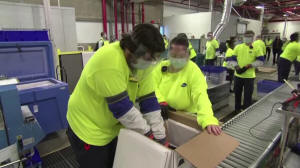U.S. vaccine campaign launches with first shipments 'delivering hope' to
millions
 Send a link to a friend
Send a link to a friend
 [December 14, 2020]
By Lisa Baertlein [December 14, 2020]
By Lisa Baertlein
(Reuters) -Cargo planes and trucks with the
first U.S. shipments of coronavirus vaccine fanned out from FedEx and
UPS hubs in Tennessee and Kentucky on Sunday en route to distribution
points around the country, launching an immunization project of
unprecedented scope and complexity.
The inoculations, seen as pivotal to ultimately halting a surging
pandemic that is claiming more than 2,400 U.S. lives a day, could begin
as early as Monday.
The first are likely to be at vaccination sites closest to any of the
145 initial shipment destinations nationwide, or those nearest the FedEx
Corp or United Parcel Service cargo centers that are relaying deliveries
from the factory.
Governor Andy Beshear of Kentucky suggested the very first injections of
the vaccine will be given in his state, home to the UPS Worldport
sorting facility in Louisville - one of two distribution command
centers. The other is the FedEx air cargo hub in Memphis, Tennessee.

"We now believe that the first individuals will be vaccinated here in
the commonwealth tomorrow morning. We are less than 24 hours away from
the beginning of the end of this virus," Beshear wrote on Twitter on
Sunday.
The coronavirus vaccine, developed by Pfizer and its German partner
BioNTech, gained emergency-use approval from federal regulators late on
Friday, clearing the way for distribution to begin a mere 11 months
after the United States documented its first COVID-19 infections.
The monumental undertaking began early on Sunday with trucks carrying
dry ice-cooled packages of vaccine - which must be kept at sub-Arctic
temperatures - from Pfizer's facility in Kalamazoo, Michigan, to UPS and
FedEx planes waiting at air fields in Lansing and Grand Rapids.
TWO HUBS, MANY SPOKES
From there, the delivery jets whisked the shipments to UPS and FedEx's
respective cargo hubs in Louisville and Memphis, for distribution on
planes and trucks to the first 145 of 636 vaccine-staging areas across
the country. A second and third waves of vaccine shipments were due to
go out to the remaining sites on Tuesday and Wednesday.
“Today, we're not hauling freight, we're delivering hope,” said Andrew
Boyle, co-president of Boyle Transportation, which was hired by UPS to
help ferry vaccine from the factory to a waiting plane in Lansing.
The precious cargo was escorted to airports by body-armor-clad security
officers.
Boyle employee Bonnie Brewer, 56, said decades of experience hauling
chemotherapies and other life-saving drugs prepared her for the historic
run.
"It feels amazing,” Brewer told Reuters after the cargo was safely
handed off.
Healthcare workers and elderly residents of long-term care homes will be
first in line to get the inoculations of a two-dose regimen given about
three weeks apart.
Public health officials have warned Americans not to become complacent
about wearing masks and avoiding crowds in the meantime.
More than 100 million people, or about 30% of the U.S. population, could
be immunized by the end of March, U.S. Operation Warp Speed chief
adviser Dr Moncef Slaoui said in an interview with Fox News Sunday.
[to top of second column]
|

The first shipments of COVID-19 vaccine left on trucks and planes
early on Sunday, kicking off a historic effort to stop a surging
pandemic that is claiming more than 2,400 lives a day in the United
States. Freddie Joyner has more.

That would still leave the country far short of herd immunity that
would halt virus transmission, so masks and social distancing will
be needed for months to control the rampaging outbreak.
Health officials will also have to overcome widespread hesitancy
about the new vaccines, with many Americans concerned the record
speed at which they were developed may have compromised safety.
"It is however critical that most of the American people decide and
accept to take the vaccine," Slaoui said. "We are very concerned by
the hesitancy that we see."
SPECIAL DELIVERY
The massive logistical effort is further complicated by the need to
transport and store the Pfizer/BioNTech vaccine at minus 70 Celsius
(minus 94 Fahrenheit), requiring enormous quantities of dry ice or
specialized ultra-cold freezers.
Workers clapped and whistled as the first boxes were loaded onto
trucks at the Pfizer factory. The long-awaited moment comes as the
U.S. death toll was approaching 300,000 and infections and
hospitalizations set daily records. Some models project that deaths
could reach 500,000 before vaccines become widely available in the
spring and summer. (Graphic: https://tmsnrt.rs/34pvUyi)
Slaoui said the United States hopes to have about 40 million vaccine
doses - enough for 20 million people - distributed by the end of
December. That would include vaccines from both Pfizer and Moderna
Inc. An outside FDA advisory panel is scheduled to consider the
Moderna vaccine on Thursday, with emergency use expected to be
granted shortly after.
The Pfizer/BioNTech vaccine was found to be 95% effective in
preventing illness in a large clinical trial. It is not yet known if
it prevents infection or transmission of the coronavirus.
UPS and FedEx package delivery drivers are giving the vaccine
priority over holiday gifts and other parcels, as health officials
plead with the public to avoid holiday gatherings following a
post-Thanksgiving spike in hospitalizations and deaths.

Both companies have expertise handling fragile medical products and
are leaving little room for error. They are providing temperature
and location tracking to backup devices embedded in the Pfizer
boxes, and tracking each shipment throughout its journey.
(Reporting by Lisa Baertlein in Los Angeles; Additional reporting by
Susan Cornwell and Richard Cowan in Washington and Peter Szekely in
New York; Writing by Steve Gorman; Editing by Joseph White, Lisa
Shumaker and Bill Berkrot)
[© 2020 Thomson Reuters. All rights
reserved.] Copyright 2020 Reuters. All rights reserved. This material may not be published,
broadcast, rewritten or redistributed.
Thompson Reuters is solely responsible for this content. |